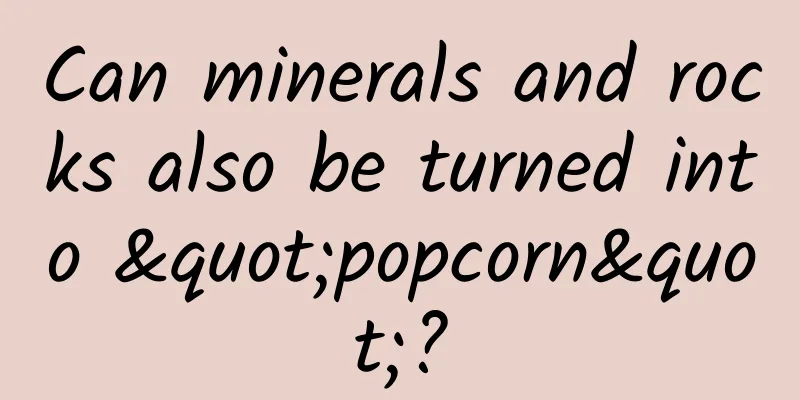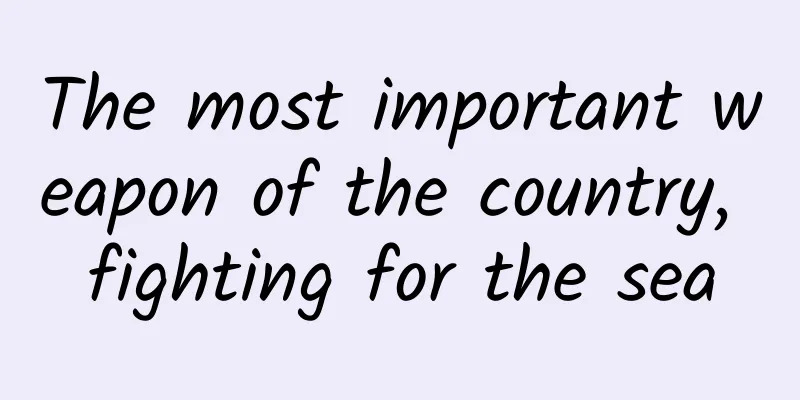Can minerals and rocks also be turned into "popcorn"?

|
Produced by: Science Popularization China Author: Earth Story Team Producer: China Science Expo Everyone is familiar with popcorn, but have you ever tried putting a rock into a popcorn machine? I don't know what the effect will be. However, you can still turn rocks into "popcorn" without a popcorn machine. Although you can't eat it, don't underestimate its usefulness! (Photo source: veer photo gallery) Vermiculite with heating expansion properties Vermiculite is very similar to mica, in the form of flakes, with a general size of several millimeters and a large size of more than ten centimeters. The vermiculite particles in the soil are very small, only a few microns. Large particles of vermiculite can be seen in thicker flakes, which are not easy to separate into very thin flakes like mica. Vermiculite has some color, such as brown, yellowish brown, golden yellow, dark green, etc. It is not as shiny as mica, and it gives people a greasy feeling. When it is peeled into flakes, this flake has no elasticity, only flexibility. When small pieces of vermiculite are placed on fire, it expands very quickly, from a thin piece to a volume that increases by 10-20 times, and up to 30-40 times. After burning, the volume of vermiculite expands and bends, and it can float on the water. The color also changes from the original green to light golden yellow and silver white. It floats on the water like a leech, which is why it gets its name. (Photo source: veer photo gallery) Why does vermiculite have this property of expanding when heated? This is related to the composition and internal structure of vermiculite. When vermiculite is heated, the water molecules contained between the layered structures turn into steam, and the pressure generated causes the layers to be rapidly stretched, so expansion occurs. After expansion, the relative density of the mineral decreases from the original 2.4-2.7 to 0.6-0.9, so it can float on the water (the relative density of water is 1). Expanded vermiculite has excellent thermal insulation, sound insulation, insulation, flame retardancy, cation exchange performance, etc. Therefore, vermiculite is widely used in many departments. For example, because its relative density is only 1/7 of that of sand and gravel, it can be made into bricks, roof panels, etc. for walls of high-rise buildings. Because the thermal conductivity of vermiculite is very low, it can be used as an insulation (heat preservation) layer as a wrapping material for gas, water, and oil pipelines, which can greatly save energy. Since vermiculite contains exchangeable cations between layers, it can be used for environmental protection, used to treat wastewater or absorb oil on the water surface to purify the environment. In agriculture, it can be used to store water and retain moisture to improve the air permeability and water content of the soil, so that the soil structure can be improved. It has a good effect on the improvement of sandy soil in arid areas. In horticulture, expanded vermiculite can be used for the cultivation and seedling raising of flowers, vegetables, and fruits, and is also suitable for lawn planting. Since it can enable crops to obtain sufficient water and nutrients from the early stage of growth, it can make plants grow rapidly. Some people have conducted experiments and found that adding 0.5-1% expanded vermiculite to compound fertilizer can increase crop yields by 15-20%. Expanded vermiculite can also be used in animal husbandry as a feed additive, absorbent, fixative, etc. After adding expanded vermiculite to feed, it can absorb toxic substances in the feed, improve the quality of milk and eggs, reduce the odor of livestock feces, reduce humidity, delay decay, and improve the growth environment of livestock. Perlite with "popcorn" characteristics Another rock with "popcorn" characteristics is perlite. The perlite family also includes pitch rock and obsidian, both of which are volcanic glass, but perlite is the most commonly used. Perlite is a rock formed by the gradual condensation of acid-absorbing (high SiO2 content) magma after a volcanic eruption. It is named "perlite" because of the arc-shaped cracks formed inside it due to contraction during the condensation process. (Photo source: veer photo gallery) Perlite is widely distributed in my country, especially in the southeast coastal provinces, central and southern China, northeast China and Inner Mongolia. Perlite is often produced in layers and lenses, and can be mined in open pits. Perlite has various colors, such as light brown, grayish white, yellowish white, green, etc. Perlite is hard and brittle, with a strong glass luster. The fragments are flaky, the edges can be very sharp, and shell-like stripes can often be seen on the cross section. Perlite has a high refractoriness. For example, the refractoriness of perlite from a certain place in Inner Mongolia has been measured by the Beijing Metallurgical Construction Research Institute to be 1200-1330℃. The reason why perlite has the "popcorn" property is mainly because of the water content in its composition. Because of the water content, the fine-grained perlite (about 0.4mm) is instantaneously roasted at a certain temperature, and the water contained in it vaporizes to make the small particles expand like white particles of "popcorn". It has many holes inside, and this is called expanded perlite. The water content and iron content in the perlite composition have a great influence on its expansion. Low water content and high iron content are not conducive to expansion. Expanded perlite is white, odorless and tasteless, with a low relative density of 71 kg/m3 and a low thermal conductivity of 0.06-0.07W/MK. Therefore, expanded perlite can be used in construction like expanded vermiculite, as a light building material, with good sound insulation, heat insulation, energy saving, thermal insulation and other excellent properties. It can also be used in environmental protection, agriculture, forestry, animal husbandry and food and beverage industry. Nature's colorful minerals always bring us all kinds of surprises! |
<<: The diagnostic criteria for hypertension have changed! Check yourself →
>>: How was the deepest hole on Earth dug?
Recommend
Android WeChat released version 7.0.22, adding many new features
Recently, Android WeChat released the official ve...
Watch the best TV shows on your tablet Mango TV client dual platform experience
From the old "Happy Camp" to the recentl...
Google outlines Android app development and policy changes for 2021
Google has just disclosed its development plan fo...
What is the "Disease X" that the WHO has repeatedly warned about? | BoLan Daily
Your best "insider" in the scientific c...
The "Quiet Night Thoughts" you recited was never seen by Li Bai
Recently, the movie "30,000 Miles from Chang...
How many profound scientific truths are contained in one meter and one second? It may subvert your imagination
We live in a three-dimensional world, that is, ev...
Don't sleep like this anymore! Your brain is more likely to have problems and your body will age prematurely...
In real life, many people have two criteria for j...
Don’t ask! Milk tea is drunk in the afternoon, people go crazy at night
Who is the most popular beverage in the beverage ...
Foot Reflexology: Chen Bingle's Traditional Chinese Medicine Foot Reflexology Course
Foot Reflexology: Chen Bingle's Chinese Medic...
The vaccine booster shot is here, should I get another one?
This article was first published by Hunzhi (WeCha...
Kitchen air conditioning is really not an IQ tax
Kitchen air conditioning is a rather unfamiliar c...
Why do companies rely on Baidu bidding hosting today?
Why businesses rely on Baidu hosting today With t...
18 details of Baidu's ocpc delivery
Baidu Big Search ocpc was launched in the second ...
In addition to PV and UV, product operations also need to pay attention to these indicators!
In the past six or seven years, I have been starti...
How much is one gram of Cordyceps sinensis in Nagqu, Tibet in 2020
Cordyceps sinensis has been a very nourishing med...









